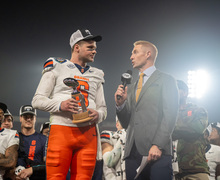Beefed-up security nothing new for Big Easy
For all the extra manpower, cutting-edge technology and allocated funds the Louisiana Superdome will receive to aid security measures at this weekend’s Final Four in New Orleans, there’s one unnoticed factor that may hold the key to successfully securing the Superdome.
The San Diego Padres.
Confused? You should be, because there’s no logical reason that a Southern California baseball team can be a New Orleans arena’s last line of defense. But, because of one logic-defying man, it’s true.
Dion Rich is a renowned gate crasher. Ever since he snuck into Super Bowl I in 1966, he’s been an uninvited, unwelcome and non-paying guest at thousands of events, including every Super Bowl, the Academy Awards and, yes, several Final Fours.
But Rich, a San Diego native, won’t be in New Orleans tomorrow when Syracuse plays Texas at the Superdome at 8:37 p.m. He’s got a Padre game to crash.
‘I go to all the Padre games,’ Rich said. ‘Haven’t missed one in 16 years. Got San Francisco and Los Angeles this weekend.’
So the Padres, of all teams, save the Final Four from one more Rich crashing. After all, Rich will be slipping past guards at Qualcomm Stadium, thousands of miles away from Cajun Country.
Though the NCAA needn’t worry about Rich, it is still taking major security precautions this weekend, including building a wall around the perimeter of the arena, setting up security checkpoints and employing 200 out-of-city enforcement officers. Of course, bringing together thousands of Americans to watch a sporting event during wartime is not something the NCAA is taking lightly.
‘It’s daunting all the time, regardless of whether America is at war,’ said Greg Shaheen, managing director of the Division I men’s basketball championship operations. ‘The issue of bringing 54,000 people together is logistically complicated and something that requires an extraordinary amount of time and effort on behalf of a number of people in coordination among various agencies.’
Throughout the NCAA Tournament — which started almost at the same time as America’s war against Iraq — enhanced security measures have been employed at all sites. Fans have not been permitted to leave a session and re-enter, the scrutiny of bag inspections has increased and large or potentially dangerous items have been barred from arenas.
At the Superdome, the NCAA will take even more precautions. The New Orleans Police Department has worked with NCAA officials and the federal government to complete a security plan.
The main security goal is to keep people from driving close to the Superdome. So an 8- to 12-foot-high concrete wall will stand around the perimeter of the Superdome. There will be diverted traffic and restricted parking, along with a street changed to a pedestrian-only area. To further control access to the venue, officials will add several additional checkpoints where officers will pat down patrons.
The New Orleans police and 200 extra enforcement officers from neighboring jurisdictions will patrol those checkpoints and the wall. Some officers will be in plain clothes, and some will be perched at high points to better view the city.
Shaheen doesn’t expect the checkpoints to affect the flow of fans entering the Superdome. Since the first game, Marquette vs. Kansas, starts at 6:07 p.m. and gates open at 2, waiting in lines should be minimal.
The New Orleans police have a unique advantage in handling events like this. The force handled perhaps the most scrutinized security operation in sporting history when the Superdome hosted Super Bowl XXXVI last year, the first post-Sept. 11 Super Bowl.
That game was declared a Level II National Security Event, meaning the federal government took the lead in security. This year’s Final Four is not an NSE, but the federal government is involved.
The experience with Super Bowl XXXVI is just a portion of New Orleans’ advantage. With Mardi Gras, Saints football games and numerous conventions and festivals, an event like the Final Four is commonplace for the city, which even has its own Homeland Security Unit.
‘New Orleans is known for holding large events,’ New Orleans police Capt. Marlon Defillo said. ‘It’s another large event for the city. We probably have the lead on many departments because of what we did with Super Bowl XXXVI with the level of security that we had there. Basically, we followed many of the same procedures we did with Super Bowl XXXVI.’
Though Rich crashing the Padres game this weekend spares the Superdome, the gate-crasher already has the arena on his resume, anyway.
Despite all the enhanced security at the Superdome for Super Bowl XXXVI, Rich sidled his way past fences, metal detectors and security without a proper pass, much less a ticket.
‘I got lucky there to get in a side door somebody left open,’ Rich said. ‘I usually look for a guy with an ear phone talking to his supervisor. That means he’s off-duty. That or I find a young minority or a woman to work on. That lowers your odds of getting caught.’
Rich’s simplistic approach has never failed. Although his intentions are harmless, his actions raise troubling questions. Could a lunatic carrying a vial of deadly chemicals somehow get past checkpoints undetected and happen upon an unattended door this weekend?
The Expert himself isn’t worried.
‘It doesn’t frighten me,’ Rich said. ‘People ask me, ‘Dion, could bin Laden do what you do?’ Well, it’s possible but highly improbable. They don’t have my expertise.’
Thank God.
Published on April 3, 2003 at 12:00 pm





